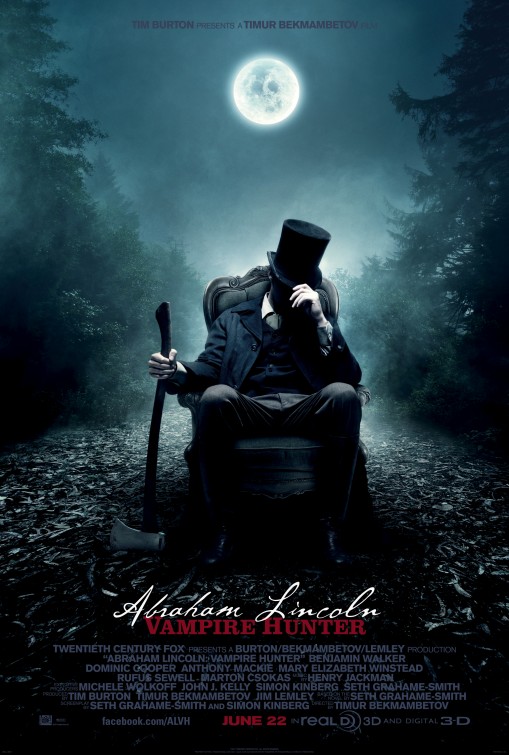
Abraham Lincoln, Vampire Hunter, action in abundance in an entertaining plot that deserved to be adapted into two feature films.
Two films seem to live together in the film adaptation of the novel directed by Timur Bekmambetov and produced by Tim Burton. The first is a proposal even rowdy, fun. It is the closest to other prior film Bekmambetov, Wanted. We are witnessing in that first part to the forging of the superhero Abraham Lincoln, his training to kill vampires and its conversion in an executor. The big moment of the first half is the fight in the stampede of horses. Spectacular and sassy. The second part comes after a temporary ellipsis of several years and presents Abraham Lincoln already became President of the United States, after having left for years hunting vampires. In this second part where everything was festive and fun in the first acquires a more transcendent and dense tone. It is consistent with the narrative approach of the film and the evolution of the protagonist, but in the second half we miss the thug air in the first half, which mimics the B movies as well and it is therefore much more fun. The problem is that in the second half the film is subject to a tension between his personality as a product of fantasy and the attempt to also be a time and epic drama. We are witnessing the war between the Union and the Confederacy up to the battle of Gettysburg in the second half. The way of presenting the Confederates as villains vampires allies seems to have aroused controversy in United States, perhaps by the simplification of this second half, dealing with historical events with lightness and schematic way. This causes even more tension between their aspirations as living with the fable of terror. As historical film, the production design is bright, but treatment of the keys of the Civil war is topical and naive, especially when dealing with the issue of the release of the slaves. I think the Manichaeism in the treatment of war between North and South harms the aspirations of the second half as historical film. Also lacks resources to give true epic tone to the Battle of Gettysburg.
This imbalance between the first and the second half indicated that it would have been good idea to shoot two films about the novel by Seth Grahame-Smith, following the strategy of adaptation of The Hobbit raised by Peter Jackson. The arc of the character development and the historic environment that surrounds it are so extensive that put it all in 105 minutes of footage has generated this imbalance between the first and the second half. The youth of Lincoln and his training as an executor of vampires had material enough to give rise to a first film. The life of Lincoln as a tenant of the White House and the stage of the Civil War also deserved his own feature film. Thus we would have avoided wasting some characters, as the vampire Vadoma (Erin Wasson), who deserved more development. The same thing happens with the character of Will Johnson (Anthony Mackie), a pioneer of the secret service.
Nevertheless, the film is a competent product of action and evasion featuring choreography by sequences of struggle inspired by Matrix that allows us to see clearly and slow the evolution of the real star of the function: Lincoln´s ax. Undoubtedly a tool that everyone would like to have in our collection.
Another thing I liked is the way to present the transformation and the vampire attacks. After the romantic excesses of the Twilight saga and its variants, appreciate this return to traditional vampires portrayed as predators.
I also like the character of Mary Todd Lincoln (Mary Elizabeth Winstead). Too bad no advantage over the more adventurous side of it that comes too late, when the movie is almost over.
The same is true of the antagonist, Adam (Rufus Sewell). It deserves more sequences in this plantation in the South that has reminded me of a novel about vampirism on the Mississippi written by George R.R. Martin, author of Game of thrones, entitled Fevre Dream. I think that the film would win much giving more prominence to the vampires, somewhat blurred in the entire film. Returning to the imbalance between the first and the second half with regard to protagonist and antagonist, in the first half works much better the duel Lincoln (Benjamin Walker) versus Barts (Marton Csokas) than the confrontation Lincoln versus Adam in the second half. It is something that is repeated in the Timur Bekmambetov filmography: movies tend to be better in the first half than in the second. As it is the case in their previous titles, where more shines visual talent of this director is in the sequences of action, an overwhelming display of visual energy. The stampede of horses and the attack on the train scenes are very good examples of synergy between the language of the comic and film that is manifesting itself in recent times in action and fantasy films. The film becomes a comic where the action moving fragmented and extended over time with slow majestic.
Conclusion: a good product of entertainment that shines in the first half and provides us with a healthy return of vampires as protagonists of horror movies. I’ll stick with the Lincoln superhero of the first half and not so much with the Lincoln President in the second.
Miguel Juan Payán
{youtube}MmexgVvm4o8{/youtube}
COMENTA CON TU CUENTA DE FACEBOOK




